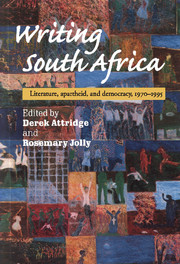Book contents
- Frontmatter
- Contents
- Contributors
- Acknowledgements and note on references
- South Africa, 1930–1996: a chronology
- Maps
- 1 Introduction
- 2 Interrogating silence: new possibilities faced by South African literature
- 3 I am dead: you cannot read: André Brink's On the Contrary
- 4 Endings and new beginning: South African fiction in transition
- 5 The post-apartheid sublime: rediscovering the extraordinary
- 6 Postmodernism and black writing in South Africa
- 7 Shame and identity: the case of the coloured in South Africa
- 8 A man's world: South African gay writing and the State of Emergency
- 9 The final safari: on nature, myth, and the literature of the Emergency
- 10 Interview
- 11 Speech and silence in the fictions of J.M.Coetzee
- 12 ‘Dialogue’ and ‘fulfilment’ in J.M. Coetzee's Age of Iron
- 13 Interview
- 14 Inside out: Jeremy Cronin's lyrical politics
- 15 Spinning out the present: narrative, gender, and the politics of South African theatre
- 16 South African theatre in the United States: the allure of the familiar and of the exotic
- Position papers
- Select bibliography: South African literary writing in English, 1970–1995
- Index
2 - Interrogating silence: new possibilities faced by South African literature
Published online by Cambridge University Press: 05 July 2011
- Frontmatter
- Contents
- Contributors
- Acknowledgements and note on references
- South Africa, 1930–1996: a chronology
- Maps
- 1 Introduction
- 2 Interrogating silence: new possibilities faced by South African literature
- 3 I am dead: you cannot read: André Brink's On the Contrary
- 4 Endings and new beginning: South African fiction in transition
- 5 The post-apartheid sublime: rediscovering the extraordinary
- 6 Postmodernism and black writing in South Africa
- 7 Shame and identity: the case of the coloured in South Africa
- 8 A man's world: South African gay writing and the State of Emergency
- 9 The final safari: on nature, myth, and the literature of the Emergency
- 10 Interview
- 11 Speech and silence in the fictions of J.M.Coetzee
- 12 ‘Dialogue’ and ‘fulfilment’ in J.M. Coetzee's Age of Iron
- 13 Interview
- 14 Inside out: Jeremy Cronin's lyrical politics
- 15 Spinning out the present: narrative, gender, and the politics of South African theatre
- 16 South African theatre in the United States: the allure of the familiar and of the exotic
- Position papers
- Select bibliography: South African literary writing in English, 1970–1995
- Index
Summary
One of the most challenging statements I have ever heard came from a wise old Frenchman. ‘La parole sert à corriger le silence’, he said; adding under his breath, ‘Mais le silence est in-cor-ri-gi-ble.’ Not that I'm sure language inevitably ‘corrects’ silence: there would be in such a claim an arrogance I hesitate to endorse; but that the word interminably and indefatigably strives to interrogate silence, of that I have no doubt.
The writer's primary engagement, I should like to argue, is with silence. Provided the assumptions underlying the statement are clarified. This kind of interrogation is not a power-play but a dialogue. Silence is not to be thought of as an opponent or an adversary; it is not simply the ‘other’ of language. If words are indeed, from a certain point of view, wrested from silence, it is equally true that silence may be read to inhere in language itself. This provides a clue to the kind of dialogic writing I have in mind: a coexistence of silence and the word. If all writing demonstrates the tension between the spoken and the unspoken, the sayable and the unsayable, these elements of the dialogue should not be seen as opposites in a binary equation, but at most as end points on a sliding scale – the kind of notion fuzzy mathematics would express in a scale between 0 and 1.
- Type
- Chapter
- Information
- Writing South AfricaLiterature, Apartheid, and Democracy, 1970–1995, pp. 14 - 28Publisher: Cambridge University PressPrint publication year: 1998
- 37
- Cited by

